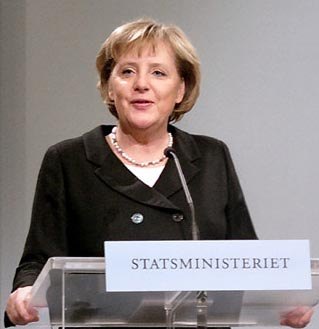Election winners discuss a new German coalition
 Angela MerkelBerlin - The parties which between them won a majority in the German general election opened negotiations Monday in Berlin on the policies and cabinet of their planned coalition government.
Angela MerkelBerlin - The parties which between them won a majority in the German general election opened negotiations Monday in Berlin on the policies and cabinet of their planned coalition government.
Chancellor Angela Merkel has said she hopes her Christian Democratic bloc and the newcomers, the Free Democratic Party (FDP), can reach an agreement by November 9. The parties are still at odds over whether Germany can afford substantial tax cuts.
Officials from the parties said the atmosphere at the three hours of negotiations had been friendly, with 10 sub-committees appointed to discuss the different policy areas and a timetable agreed.
As they arrived for the talks, both sides radiated harmony.
"We'll be conducting these coalition talks with a sense of partnership and fairness, knowing of course that there are differences, but especially knowing that voters gave us a mandate to pursue sensible policies for the next four years," said Merkel.
Guido Westerwelle, the FDP leader, said, "Of course there are differences. That's life. But these are all matters that can be bridged." He is widely expected to be offered the job of Germany's foreign minister when a deal is struck.
Coalition agreements are fundamental documents in Germany, governing four years of legislative plans and allocating cabinet portfolios among the parties, which explains why they take weeks to draw up, often generate tension and must be strictly observed.
Each party, including the Christian Social Union (CSU), the Bavaria-only sister party to Merkel's Christian Democratic Union (CDU), sent nine delegates to the meeting in the state of North Rhine Westphalia's Berlin liaison office.
Outside, 1,000 protesters demonstrated against nuclear power. The election winners favour extending the operating life of some German nuclear power plants, which would mean altering a legislative timetable requiring Germany to be nuclear free by about 2022.
Volker Kauder, the CDU floor leader, said the names for cabinet portfolios would not to be discussed initially.
Westerwelle's party is seeking tax cuts to promote business investment and an exemption for companies with less than 20 staff from German laws that give staff legal rights to challenge layoffs.
Tax cuts are expected to be a key area of conflict.
On Saturday, a study by Merkel's office warned that the federal budget would already be under strain even before tax cuts, with total forecast revenue in the three years 2011-13 falling 40 billion euros (58 million dollars) short of planned spending.
Government spokesmen said Monday those numbers were a "snapshot" and therefore not authoritative.
The leak of the numbers was taken as a warning to both the FDP and the CSU that their calls for tax cuts were impractical.
Coalition talks in Germany are always drawn out affairs.
Even where parties have been in relative harmony, the fastest time it has taken to agree a federal coalition was 23 days in 1969 and 1983. Four years ago, it took Merkel 65 days to reach an accord to govern jointly with the Social Democrats, the CDU's old rival.
At the September 27 German general election, the Social Democrats suffered deep losses and are going into opposition.
In 1976, deep differences on pension policy meant it took a record 73 days for the election winners to hammer out a federal pact. dpa